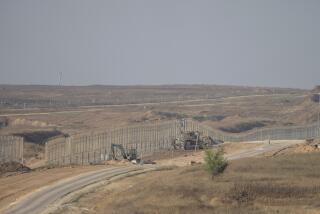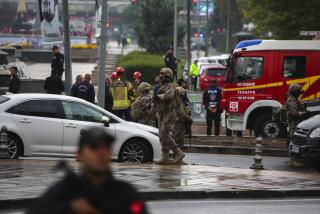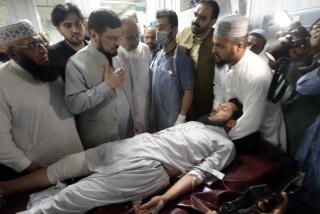Iraqi Suicide Bomber Began With a Diatribe
- Share via
BAGHDAD — The young man had something to say.
Inside an Iraqi army recruiting station Sunday morning, he launched into a rant about unemployment and corruption in the new Iraq.
“Why won’t they give us jobs unless we pay someone off?” he said in Iraqi-accented Arabic, witnesses said. As a crowd of young men drew closer to listen, he blew himself up, killing at least 22 Iraqis and injuring 43.
After a brief lull, insurgents renewed their campaign of violence across the country Sunday. Dozens were killed or wounded in a spate of car bombings, suicide attacks and shootings in the capital, in Kirkuk, near Mosul and Fallouja, and on the Syrian border.
The recruiting center attack, the sixth on the former Muthana air base and the deadliest single attack in Baghdad since the June 19 suicide bombing of a restaurant frequented by Iraqi police, was tailored to inflict maximum casualties.
Witnesses said the nondescript bomber had arrived at the base before 9 a.m., maneuvering past security guards and giant sandbags meant to blunt the impact of bombs.
He waited to gather a crowd before he detonated an explosive device packed with tiny ball bearings.
“The man started talking and blaming the officials in the recruiting center,” said army volunteer Mohammed Malik, 25, who was recovering from wounds at Yarmouk Hospital. “Then the explosion happened. I saw dismembered bodies, hands, legs and flesh scattered.”
Iraqi security forces and U.S. soldiers posted at the base converged on the scene. Ambulances rushed bloodied victims to area hospitals. Police sealed off the major street alongside the bombing scene, snarling traffic citywide on the first day of the workweek.
Victims’ bodies crowded the morgue of Yarmouk Hospital, which also treated many of the injured.
“Everything changed into smoke, dust and bodies of people,” Ali Hummadi, 23, said from his hospital bed. “I was worried about a second explosion. Even now, while I am in the hospital, I am afraid that one of the terrorists will enter the hospital to hurt us.”
Despite repeated attacks on Iraq’s nascent security forces, jobless young men continue to sign up in droves. In Baghdad alone, 15,000 Iraqi army recruits have passed basic training, a U.S. military official said.
Bassim Abbas, 27, who was hospitalized with shrapnel wounds, said he would return to the recruitment center for a job after he healed. “I feel embarrassed when I return to my house and am not able to bring candy for my children,” said the father of three.
Malik and two cousins traveled from Hillah, about 60 miles south of Baghdad, to sign up for the army. “We want to find a job and enjoy our lives like young people in other countries,” he said.
Other attacks Sunday demonstrated the insurgency’s continued geographical reach.
On the Syrian border, twin suicide car bombings killed at least seven Iraqi customs officials.
In Kirkuk, another suicide car bomber blew up near a hospital, killing four people. The local political leader whose entourage was the apparent target was unharmed.
Explosives in a parked car were detonated by remote control near a convoy carrying the police chief of Nimrud, 20 miles south of Mosul. Four police officers were killed; the chief lived.
In Fallouja, a former insurgent bastion overrun by U.S. forces last year, a suicide car bomber attacked a U.S. military convoy, killing one civilian and injuring one Marine.
A roadside bomb targeting a U.S. military convoy in Baghdad injured four American soldiers and set a Humvee ablaze, Iraqi police sources said. Also in the capital, rockets and mortars landed atop or near police stations in three districts as well as the Interior Ministry headquarters, injuring two officers.
Two women and seven children related to a Shiite tribal figure in Baghdad’s Baladiyat neighborhood were shot dead in their home Sunday morning, Iraqi police Lt. Haider Kamel said.
“We are asking our tribe to retaliate and avenge,” said the family patriarch, Hussein Tarish Duraji, who blamed Sunni Arab insurgents for the killings.
The Shiite Duraji tribe has over the last few months come into violent conflict with the mostly Sunni Dulaimi tribe, which has links to the insurgency.
Sectarian tensions simmer throughout the country. On Saturday, police in Baghdad discovered the body of a former general of the Iraqi army. He had been executed the night before, police said, and a note attached to his corpse accused him of participating in Saddam Hussein’s 1991 campaign to crush rebellious Shiites in Iraq’s south.
And gunmen killed a relative of Abdelaziz Hakim, leader of the dominant Shiite political party, riddling the relative’s car with dozens of bullets Sunday in Baghdad. Amar Hakim, 25, and a friend had been driving to their jobs as security guards for a cellphone company when they were slain.
*
Special correspondents in Baghdad, Kirkuk and Mosul contributed to this report.
More to Read
Sign up for Essential California
The most important California stories and recommendations in your inbox every morning.
You may occasionally receive promotional content from the Los Angeles Times.













